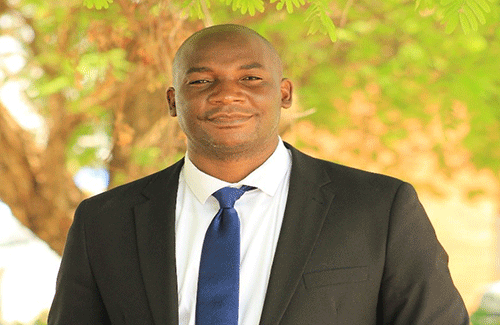Dr Kennedy kaumba Mabuku
The adoption of Agenda 2063 during the African Union Summit in January 2015 marked a pivotal moment in African development by offering a visionary path for the next 50 years.
Among its seven aspirations, Aspiration No. 4 – the pursuit of a peaceful and secure Africa – stood out to me as a beacon of hope. However, the realisation of this noble objective faces formidable challenges that cast doubt on its attainability. A sobering reality emerges as we examine the intricate dynamics surrounding Aspiration No. 4. Allow me to indicate that frequent discussions about Agenda 2063, specifically Aspiration 4, aimed at achieving a peaceful and secure Africa, are crucial because they provide a platform for proactive strategies to address persistent challenges of conflict, instability and insecurity on the continent.
Despite the significance of Agenda 2063, Aspiration 4, it is disheartening to observe the limited public discourse – not only in Namibia but across the entire African continent.
The persistent turmoil within African nations, characterised by internal and cross-border conflicts, driven by ethnic tensions, political rivalries, terrorism and extremism, resource scarcity and historical grievances, stands as a formidable obstacle to lasting peace.
Poor governance, pervasive corruption and a lack of accountability further hinder the establishment of a stable and harmonious Africa. These issues not only erode faith in institutions but also create fertile ground for conflicts to thrive if not confidently and systematically addressed. The competition for valuable resources, including land, minerals and water, frequently triggers disputes between communities and nations, heightening existing tensions and paving the way for potential violence.
Moreover, the rise of terrorist groups and extremist ideologies poses a grave threat, exploiting vulnerabilities and destabilising entire regions. Underpinning these challenges are factors such as poverty, unemployment and inequality, which foster social unrest and vulnerability to radicalisation.
Let me acknowledge in this writing that African leaders have taken a strong stance in their pursuit to realise this aspiration.
For instance, the adoption of African Peace and Security Architecture (APSA), a tool designed to address conflicts.
However, this initiative faces its own set of implementation hurdles, from coordination issues to funding shortages, limiting its effectiveness in conflict resolution. The inadequacy of financial resources allocated to peacekeeping, conflict prevention and resolution efforts further cripples APSA and the similar mechanisms intended to uphold peace and security.
In light of these complexities, the question arises: Can compromises be made in funding security institutions?
The resounding answer is no, as tangible development is intricately tied to peaceful human interactions. These inquiries give rise to further contemplation: How many among us have raised concerns about the perceived disproportionate size of defence budgets? Could the lack of a comprehensive understanding of security contribute to this skewed assumption? The responses to these queries should remain personal reflections. Today, the unfortunate reality persists as countries such as the Central African Republic, Ethiopia, Libya, Mali, Somalia, South Sudan and Syria grapple with the devastating aftermath of continuous civil conflicts, underscoring the considerable distance still to traverse in realising the Aspiration centred on peace and security. While these challenges vary across African nations, the spectre of insecurity hovers over the entire continent. It is crucial to recognise that insecurity trends are often adopted and internalised from external examples like the war in Ukraine. Thus, the emphasis is on dialogue and peace education as being vital tools for conflict prevention and resolution. I, therefore, opine that the stakeholders should consider integrating peace-related education into the curricula to ensure a culture of tolerance and peaceful interaction is nurtured from an early age.
The responsibility of building effective institutions should not fall only on governments but also on every citizen and stakeholder. This should motivate us to be peacemakers ourselves. Another consideration may be to collectively devise clear policies and mechanisms for equitable resource distribution to mitigate tensions. Collaborative efforts, driven by a shared commitment to peace, underscore that the achievement of stability requires the dedication of each individual.
In conclusion, the aspiration of a Peaceful and Secure Africa, as outlined in Agenda 2063, confronts multifaceted challenges that seem daunting. Yet, collaboratively addressing governance deficiencies, fostering dialogue, investing in developmental initiatives and fortifying conflict resolution mechanisms like APSA offers a route to surmounting these obstacles. While the path ahead is arduous, the vision of a peaceful Africa is worthy of unwavering pursuit.
*Dr Kennedy Kaumba Mabuku shares these thoughts from a personal perspective, independent of any security institutions in Namibia.


